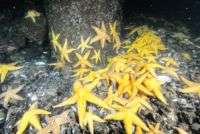Marine biologists have found that port environments are enabling invasive sea stars to breed at a rapid rate.
In a new research article, researchers found that these environments can facilitate the invasion of a significant marine pest by driving overwhelming reproductive success.
Dr. Scott Ling, from the UTAS Institute of Marine and Antarctic Studies (IMAS), is the lead author of the paper published in Journal of Applied Ecology.
"The sea star must release eggs in close proximity to sperm sources because chances of fertilization decline drastically with increasing distance between spawning sea stars," he said.
"Beneath wharves a super abundant supply of food leads to a veritable orgy of highly aggregated and fecund sea stars that achieve great fertilisation success".
Dr. Ling said the research found that wharf populations, while representing less than 10 per cent of the total sea star population in an estuary and concentrated in less than 0.1 per cent of the estuary area, can contribute up to a massive 90 per cent of all larval production in an estuary.
"A big part of the problem is that in human-dominated environments, very few native species compete with the invasive sea star," he said.
Dr. Ling said that while long-term protection of key sources of larval production is a common goal in marine reserve design and fisheries management, the same ecological concept, but in reverse - whereby larval production is minimised at key sources - is a concept yet to be broadly applied to the management of established marine pests.
"Restoring natural heritage values to achieve a more natural ecological balance in marine environments makes sense on many levels - here we have an example of what might be achievable to reduce the dominance of an exotic pest.
"While transfer of marine pests has increased globally with international shipping, the success of species once they arrive in new places can largely be determined by the ecological dynamics of the system they find themselves in," Dr. Ling said.
"There are consequences when we modify the marine environment, and exotic species can and will capitalize on opportunities to flourish."
More information: onlinelibrary.wiley.com/doi/10 … 64.2012.02133.x/full
Journal information: Journal of Applied Ecology
Provided by University of Tasmania























